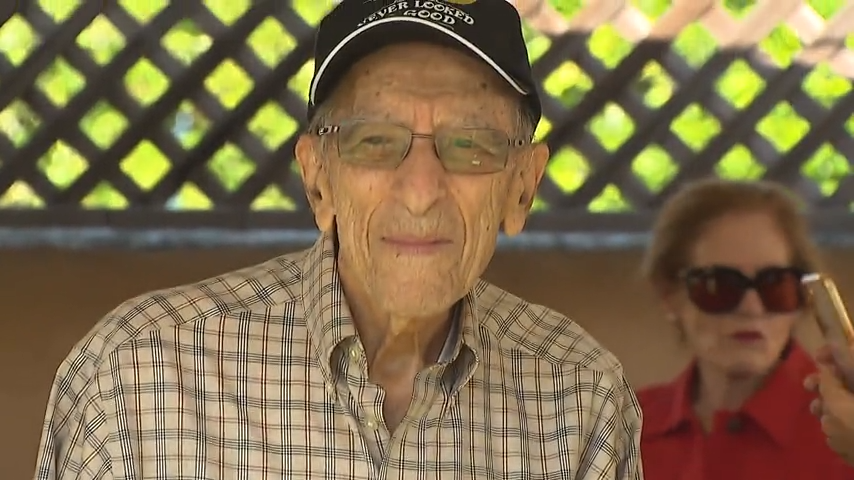New digital billboards and supergraphics were banned again in Los Angeles on Friday by a unanimous vote of the Los Angeles City Council.
The ordinance also prohibits commercial signs visible from freeways, and a last-minute amendment bans the conversion of existing billboards to digital displays.
The council approved the ordinance despite a recommendation by the city Planning Commission not to adopt it, and a warning by a billboard attorney that the measure is unconstitutional.
"This ordinance is about how we protect all our communities in the city of Los Angeles," said Councilman Ed Reyes. "It's about having the ability to essentially define our space."
Councilman Bill Rosendahl, who left his sickbed to support the measure, said, "I came because it's time for us to say enough is enough is enough on the billboard business."
Though she eventually voted yes, Councilwoman Jan Perry said she was concerned about the haste with which the City Council acted on the ordinance.
"As a policy-making body, in this particular case, we're not using the tools that we have, the careful review, the City Planning Commission, the council's Planning and Land Use Management Committee, and finally, council for this situation."
Sheri Bonstelle, a lawyer representing the billboard company In Plain Sight Media and the Roosevelt Hotel, opposed the ban saying, "it is clearly arbitrary and capricious ... This ordinance has significant constitutional issues, and would have a legal challenge against it on constitutional grounds for substantive due process, procedural due process, and vague and ambiguous grounds."
Local
Get Los Angeles's latest local news on crime, entertainment, weather, schools, COVID, cost of living and more. Here's your go-to source for today's LA news.
The city last banned digital billboards and supergraphics -- huge vinyl ads stretched across the sides of buildings -- in 2002, but courts sided with advertising companies that claimed the law was unconstitutional because it granted unfair exceptions, resulting in an uneven playing field.
Dennis Hathaway, president of the Coalition to Ban Billboard Blight, earlier said the City Council was forced to act Friday to pre-empt a possible avalanche of billboard applications in case a federal judge rejects its temporary moratorium during a hearing Aug. 17.
"The reason this is coming up as an emergency is because the moratorium that is in effect right now could be thrown out," Hathaway said.
While he agreed the proposed ordinance is necessary, he described it as "completely makeshift to address the immediate situation."
The city's planners seemed to agree.
In a report to the City Council, Chief Assistant City Attorney Pedro Echeverria noted the city's Planning Director disapproved the proposed ordinance on behalf of the Planning Commission and urged the council members not to adopt it.
"The director states in her report that she is disapproving the ordinance because it only addresses one aspect of the sign revisions that were approved by the City Planning Commission," he said.
Planning Director S. Gail Goldberg and members of the commission could not be reached for comment.
In March, the commission recommended a different ordinance to the City Council. That measure called for banning digital billboards and supergraphics except in 21 areas with designated "sign districts," including Hollywood, Encino, Canoga Park, Boyle Heights and LAX.
It also imposed restrictions on most other signs in the city, including "sale" signs on storefront windows, sometimes limiting their size to half of what is currently allowed.
"If the City Council had approved this ordinance which was adopted in March, we wouldn't be sitting in this position right now," Hathaway said.
But even he agreed that the commission's proposed ordinance needs further work. He wants it amended so that signs are allowed only in downtown Los Angeles and Hollywood.
City Councilman Richard Alarcon criticized it for dealing exclusively with new signs, and not having a plan to eliminate already existing signs. And he shrugged off the commission's rejection of the ban being considered Friday.
"I agree with the commission that we need a much broader way to address the issue of signage, but that doesn't mean we can't get there by taking incremental steps," he said.
Alarcon also called for developing "a strategy of cooperation" between billboard companies and the city. Hathaway estimates the city is facing at least 12, and possibly more than 20 lawsuits in connection with its billboard policies.
Pending litigation between the city and the billboard company, World Wide Rush LLC, also had a bearing on Friday's vote.
In that case, federal judge Audrey Collins found the city in contempt of court because it stopped World Wide Rush from putting up new supergraphics after she had already ruled that the city's billboard policies were unconstitutional.
If that ruling is overturned, then exceptions will become "operative" in the proposed ban. Those exceptions must be "pursuant to a legally adopted specific plan, supplemental use district, or an approved development agreement," according to the proposed ordinance.



